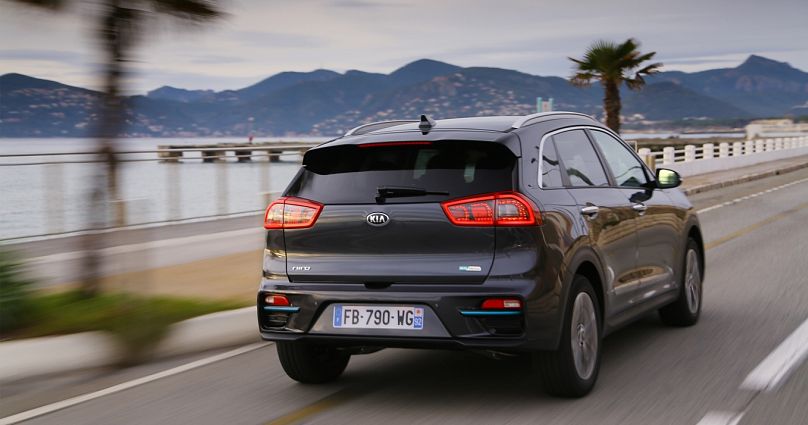Electric vehicles are more popular than ever - but with this comes hefty wait times for new models. Here's why a second-hand EV might be best for you.
Whether it’s the ever-rising price of fuel or the urgency of the climate crisis - many people nowadays are considering switching to an electric car. While walking, cycling and taking public transport are the most sustainable options, it’s clear that car ownership isn’t going away anytime soon.
 ADVERTISEMENT
ADVERTISEMENT
 ADVERTISEMENT
ADVERTISEMENT
In the meantime, local governments across the globe are introducing low emission zones and plans to ban new petrol and diesel vehicles. This has made switching to cleaner, greener methods of transport, like pure electric vehicles (EVs), much more attractive.
Unfortunately, electric vehicles are considerably more expensive to buy outright than your conventional petrol or diesel vehicles at the moment. While we imagine this price discrepancy will lower as more EVs are produced, this isn’t looking likely for the foreseeable future.
As EVs are costly to buy new, you may be wondering whether you should look at a second-hand electric car instead. Thankfully, there are now plenty of different all-electric models available to buy new or second-hand. But, there are some things you should look out for first.
Find the right electric car for you
While this may seem obvious, it is so important to research what kind of electric car you want and need for your lifestyle. One of the biggest changes to driving an electric car, in comparison to a conventional petrol or diesel one, is that EVs have a limited driving range.
How far an electric car can travel before needing to be charged again will depend on the model you buy. Some electric cars have ranges of well over 482 kilometres, whereas others can only travel 193 kilometres before needing to be charged.
Remember, an EV's battery efficiency does drop over time so a three-year-old EV could be roughly five per cent less efficient.
You should consider what you’re going to use this car for and how many kilometres you’ll be travelling daily and weekly. When you’ve thought about these factors, it’ll be easier to find an electric car that will actually work for you.
If you only travel less than 160 kilometres a day, you may be happy with something smaller like the Renault Zoe. Whereas, those travelling further or with families may want a bigger vehicle, in which case the Kia e-Niro may be more suitable.
Check the vehicles service history
Just like you would before you’d buy any car, checking its service history is important. You may know that electric vehicles don’t require as much maintenance as petrol or diesel vehicles, but they can still have wear and tear.
While it's true that vehicles with internal combustion engines have a lot more moving parts, electric cars still need to be maintained to a good level. Any car is only as good as its previous owners.
Ask for a report on the car's battery
An electric car's battery is arguably the most important part of the whole vehicle. Just like the battery life of your phone, laptop or computer, an EV’s battery condition can depend on a number of factors, including how it's been driven and how often.
It is currently predicted that an electric car’s battery will last anywhere between 10 – 20 years before they need to be replaced. This is pretty good as it means that even in second-hand electric cars the battery should still have a healthy lifespan left. Even some of the oldest electric cars on the market, like the BMW i3, wouldn’t be 10 years old yet.
Prior to purchasing a second-hand electric car, you can ask any electric car dealership for a report on the vehicle’s battery health. This way you’re aware of the whole picture and can make an informed decision on whether to go ahead with that EV or not.
See if the vehicle has had its battery replaced
While we’re on the topic of batteries, you should ask whether the EV you’re interested in has had a battery replacement at any point. If so, the seller should be able to provide you with the relevant documentation for this.
As we said, an electric car’s battery can last anywhere between 10 – 20 years so it could be great news if the car has had a replacement. The more recently the battery has been replaced, the less likely it is to need replacing again soon.
Check the vehicles safety rating
Alongside the battery, a car's safety rating is another important thing to check before buying a second-hand EV. The easiest way to check a vehicle's safety rating is by using the European New Car Assessment Programme (Euro NCAP). Euro NCAP is a non-profit organisation that provides safety assessments annually on all vehicles.
Cars are scored using a star system which rates how safe the vehicle is overall. On top of this, vehicles are rated on their modern safety technology - including how well they protect adults, child passengers and vulnerable road users.
In 2021, the Polestar 2, Mercedes EQS and the Volkswagen ID.3 all came out on top. All three vehicles score five stars in their overall safety, which means they provide “excellent performance in crash protection.”
When looking to buy a second-hand electric vehicle, it might be worth having a look through Euro NCAP’s previous rating. While owning an electric car is fun and great for the environment, it also needs to be safe, stable and reliable.
The safety of any vehicle is something that we should never compromise as the risk of accidents is always there. Electric vehicles should give you the same sense of security a conventional car does.


















